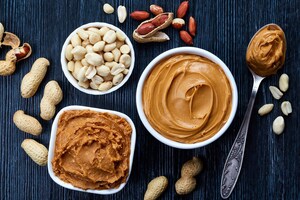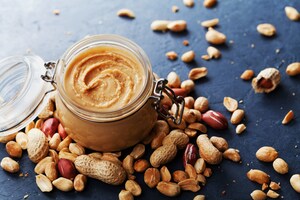WASHINGTON, March 11, 2013 /PRNewswire/ -- Oil roasted salted peanuts are now certified heart-healthy by the American Heart Association as a part of an overall healthy eating pattern. The Heart Check mark may now appear on their packages, making them a great snack for National Nutrition Month and National Peanut Month this March.
(Logo: http://photos.prnewswire.com/prnh/20130311/PH74926LOGO )
Although salted peanuts are often thought to be a high sodium snack, consumers should check the Nutrition Facts panels because a one-ounce serving of many varieties of oil roasted salted peanuts contain only 119mg of sodium, which is below the AHA certification criteria limit of 140mg of sodium per label serving of nuts. These varieties of salted peanuts generally contain less sodium than one slice of bread (1 ounce). In addition, peanuts are naturally very low in sodium, and the sodium in salted peanuts is mostly from surface salt, so a little goes a long way in flavor.
Most roasted peanuts are cooked in peanut oil, which contains the same heart-healthy monounsaturated fats found in olive oil. However, roasting them in oil will not increase their overall fat content. In fact, roasting peanuts in a heart-healthy oil makes them tasty and nutritious.
AHA research has shown that nuts may reduce the risk of heart disease in individuals with high cholesterol. And additional studies, like the Adventist and Nurse's Healthy studies have shown that eating peanuts may cut your risk of heart disease in half.
Peanuts are high in many important nutrients for overall health.
- An excellent source of cholesterol-free protein with 8 grams per 1 ounce serving.
- An excellent source of Niacin and Vitamin E.
- A good source of folic acid.
- A good source of potassium and contain magnesium, which help to maintain normal blood pressure.
According to the Center for Disease Control (CDC), heart disease is the leading cause of death in the U.S. and accounts for 1 in every 4 deaths. Prevention is key, and lowering blood pressure and cholesterol by eating a balanced diet that is low in sodium, saturated fat, and cholesterol, and rich in fresh fruits and vegetables will reduce your risk of heart disease.
Peanuts pair well with other heart-healthy foods like fruits, vegetables, and whole grains. Try incorporating a serving of peanuts once a day as a snack or at a meal to keep your heart healthy all day long!
*Please note that the Heart-Check Food Certification does not apply to scientific research by an organization other than the AHA unless expressly stated. For more information, see the AHA nutrition guidelines at: heartcheckmark.org/guidelines.
The Peanut Institute is a non-profit organization that supports nutrition research and develops educational programs to encourage healthful lifestyles. Learn more about peanuts and health at www.peanut-institute.org
SOURCE The Peanut Institute
WANT YOUR COMPANY'S NEWS FEATURED ON PRNEWSWIRE.COM?
Newsrooms &
Influencers
Digital Media
Outlets
Journalists
Opted In






Share this article